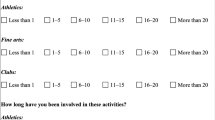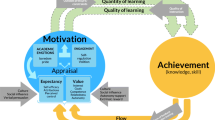Abstract
This paper presents the effects of a cognitive acceleration program in mathematics classes on Tongan students’ achievements, motivation and self-regulation. Cognitive Acceleration in Mathematics Education (CAME) is a program developed at King’s College and implemented worldwide with the aim of improving students’ thinking skills, mathematics performance and attitudes. The first author adapted the program materials to Tongan educational context and provided support to participating teachers for 8 months. This study employed a quasi-experimental design with 219 Year 8 students as the experimental group and 119 Year 8 students as the comparison group. There were a significant differences in the mean scores between the pre-test and post-test of the three instruments that were employed in the study, indicating that learning mathematics under the CAME program had a positive effect on levels of students’ self-regulation, motivation and mathematics achievement. Students also reported changes to the ways they learn mathematics.

Similar content being viewed by others
References
Adey, P. (1999). The science of thinking, and science for thinking: A description of cognitive acceleration through science education (CASE) (Innodata Monographs 2). Geneva, Switzerland: International Bureau of Education.
Adey, P., Hewitt, G., Hewitt, J. & Laudau, N. (2004). The professional development of teachers: Practice and theory. Boston, MA: Kluwer.
Adey, P., Robertson, A. & Venville, G. (2002). Effects of a cognitive acceleration programme on year I pupils. British Journal of Educational Psychology, 72(1), 1–25.
Adey, P. & Shayer, M. (1993). An exploration of long-term far-transfer effects following an extended intervention program in the high school science curriculum. Cognition and Instruction, 11(1), 1–29.
Adey, P. & Shayer, M. (1994). Really raising standards: Cognitive intervention and academic achievement. London, United Kingdom: Routledge.
Adey, P., Shayer, M. & Yates, C. (1989). Thinking science: The curriculum materials of the CASE project (1st ed.). London, United Kingdom: Nelson.
Adey, P., Shayer, M. & Yates, C. (2001). Thinking science: The curriculum materials of the CASE project (3rd ed.). London, United Kingdom: Nelson.
Adhami, M. & Shayer, M. (2007). Thinking maths: Cognitive acceleration in mathematics education (CAME). Oxford, United Kingdom: Heinemann Educational Books.
Aunio, P., Hautamäki, J. & Van Luit, J. E. H. (2005). Mathematical thinking intervention programmes for preschool children with normal and low number sense. European Journal of Special Needs Education, 20(2), 131–146.
Backwell, J. L. & Hamaker, T. (2003). Cognitive acceleration through technology education (CATE). Taunton, United Kingdom: Nigel Blagg Associates.
Cohen, J. (1988). Statistical power analysis for the behavioural sciences (2nd ed.). Hillsdale, NJ: Erlbaum.
Cohen, L., Manion, L. & Morrison, K. (2011). Research methods in education (7th ed.). New York, NY: Routledge.
Creswell, J. W. (2012). Educational research: Planning, conducting, and evaluating quantitative and qualitative research (4th ed.). Boston, MA: Pearson.
Creswell, J. W. & Clark, V. (2008). Designing and conduction mixed methods research. Thousand Oaks, CA: Sage Publications.
Fasi, U. M. L. (1999). Bilingualism and learning mathematics in English as a second language in Tonga (Unpublished doctoral dissertation). University of Reading, Berkshire, United Kingdom.
Frith, C. D. (2012). The role of metacognition in human social interactions. Philosophical Transactions of the Royal Society, B: Biological Sciences, 367(1599), 2213–2223.
Hong, A. W. C. (2010). Applying cognitive conceptual approach in developing year 6 pupils’ problem solving skills in mathematics. Pertanika Journal of Social Science and Humanities, 18, 15–35.
Kerridge, S. (2010). A study into the improvement in the mathematical academic attainment of low attainers in year 7 (11–12 year olds) when accelerated learning is used as a teaching pedagogy in the classroom (Unpublished doctoral dissertation). Durham University, Durham, United Kingdom.
Leo, E. L. & Galloway, D. (1996). Conceptual links between cognitive acceleration through science education and motivational style: A critique of Adey and Shayer. International Journal of Science Education, 18(1), 35–49.
Manu, S. (2005). Mathematical understanding and Tongan bilingual students’ language switching: Is there a relationship? (Unpublished doctoral dissertation). University of British Columbia, Vancouver, Canada.
Maume, K. & Matthews, P. (2000). A study of cognitive accelerated learning in science. Irish Educational Studies, 19(1), 95–106.
McGregor, D. & Gunter, B. (2001). Changing pedagogy of secondary science teachers: The impact of a two-year professional development programme. An International Journal of Teachers’ Professional Development, 5(1), 59–74.
Mega, C., Ronconi, L. & De Beni, R. (2014). What makes a good student? How emotions, self-regulated learning, and motivation contribute to academic achievement. Journal of Educational Psychology, 106(1), 121–131.
Ministry of Education and Training. (2014). Report of the Ministry of Education and Training for 2013, Tonga. Tonga, Nukualofa: Ministry of Education and Training.
Mok, I. & Johnson, D. (2000). Reasoning algebraically with IT: A cognitive perspective. Mathematics Education Research Journal, 12(3), 286–302.
Nunnally, J. C. (1978). Psychometric theory (2nd ed.). New York, NY: McGraw-Hill.
Olaoye, A. A. (2012). Cognitive acceleration in mathematics education lesson (CAMEL) in Nigeria. British Journal of Humanities and Social Sciences, 3(2), 77–86.
Pekrun, R. (1992). The impact of emotions on learning and achievement: Towards a theory of cognitive/motivational mediators. Applied Psychology, 41(4), 359–376.
Pintrich, P. R. (2000). The role of goal orientation in self-regulated learning. In M. Boekaerts, P. R. Pintrich & M. Zeider (Eds.), Handbook of self-regulation (pp. 451–502). San Diego, CA: Academic Press.
Pohiva, S. (2014). An outcomes-based assessment reporting approach for enhancement of teaching and learning in the Pacific islands. In R. Toumu’a (Ed.), Proceedings of the Vaka Pasifika Educational conference 2014 (pp. 125–135). Nukualofa, Tonga: University of the South Pacific.
Shayer, M. (2003). Not just Piaget; not just Vygotsky, and certainly not Vygotsky as alternative to Piaget. Learning and Instruction, 13(5), 465–485.
Shayer, M. & Adhami, M. (2007). Fostering cognitive development through the context of mathematics: Results of the CAME project. Educational Studies in Mathematics, 64(3), 265–291.
Shayer, M. & Adhami, M. (2010). Realizing the cognitive potential of children 5–7 with a mathematics focus: Post‐test and long‐term effects of a 2‐year intervention. British Journal of Educational Psychology, 80(3), 363–379.
Tatafu, M., Booth, E. & Wilson, M. (2000). Secondary school failure in Tonga: Implications for in service and pre service teacher development. Directions: Journal of Educational Studies, 19(1), 55–81.
Uata, T. (2002). Comparative effectiveness of high schools in Tonga’s education system: A production function approach (Unpublished master thesis). California State University, CA, United States.
Velayutham, S., Aldridge, J. & Fraser, B. (2011). Development and validation of an instrument to measure students’ motivation and self‐regulation in science learning. International Journal of Science Education, 33(15), 2159–2179.
Vivier, E. D. (2013). Opening schooling programmes for the Kingdom of Tonga: Report of a short-term consultancy. Vancouver, Canada: Commonwealth of Learning.
Vygotsky, L. S. (1986). Thought and language. Cambridge, MA: MIT Press.
Wolters, C. A. (1999). The relation between high school students’ motivational regulation and their use of learning strategies, effort, and classroom performance. Learning and Individual Differences, 11(3), 281–299.
Zimmerman, B. J. (2002). Becoming a self-regulated learner: An overview. Theory Into Practice, 41(2), 64–70.
Zimmerman, B. J. & Schunk, D. H. (2012). Motivation: An essential dimension of self-regulated learning. Motivation and Self-regulated learning: Theory, research and applications (pp. 1–30). New York, NY: Lawrence Erlbaum Associates.
Author information
Authors and Affiliations
Corresponding author
Electronic Supplementary Material
Below is the link to the electronic supplementary material.
ESM 1
(DOCX 2.08 mb)
Rights and permissions
About this article
Cite this article
Finau, T., Treagust, D.F., Won, M. et al. Effects of a Mathematics Cognitive Acceleration Program on Student Achievement and Motivation. Int J of Sci and Math Educ 16, 183–202 (2018). https://doi.org/10.1007/s10763-016-9763-5
Received:
Accepted:
Published:
Issue Date:
DOI: https://doi.org/10.1007/s10763-016-9763-5




